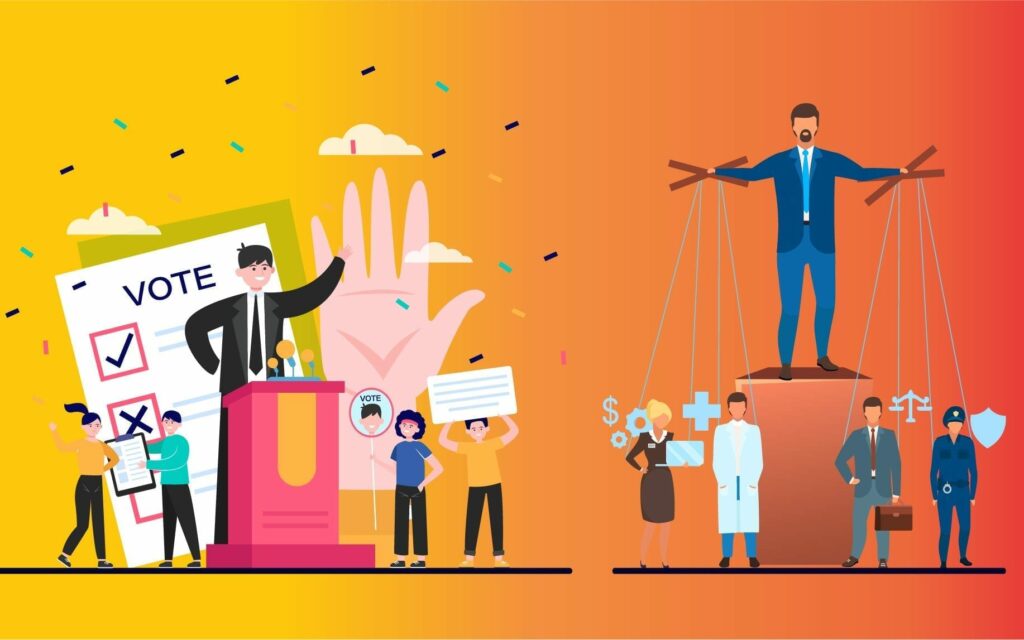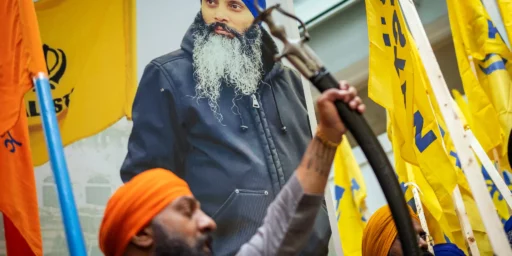Faith In Democracy on the Decline
People around the world are more skeptical about governing institutions.

When I saw the AP headline “Study finds voters skeptical about fairness of elections. Many favor a strong, undemocratic leader,” I was unsurprised. It left me unprepared for the lede:
Voters in 19 countries, including in three of the world’s largest democracies, are widely skeptical about whether their political elections are free and fair, and many favor a strong, undemocratic leader, according to a study released Thursday.
While democratic backsliding is, of course, a phenomenon with which I’m familiar, I was surprised at the extent to which it was impacting popular attitudes globally.
The report by the International Institute for Democracy and Electoral Assistance, or International IDEA, concluded that “democratic institutions are falling short of people’s expectations.” The 35-member organization promotes democracy worldwide.
”It is past time that people’s perceptions are centered in conversations about the future of democracy; this analysis is a small but important first step towards that effort,” the Stockholm-based organization wrote.
The surveys had a margin of error hovering around 2-4% and the number of respondents in each country was around 1,500. The sole exception was the Solomon Islands, where the small population meant they had a representative sample of 526 people, IDEA said.
A launch ceremony is scheduled for 1100 Eastern (1700 CEST), when I shall be boarding an airplane. Presumably, the full report will appear on the page soon thereafter. The 2023 report is here.
The methodology seems reasonable enough at first blush—although perhaps a bit too reliant on internet polling. And some of the questions are about satisfaction with life in general more so than about institutions.
In 17 countries, fewer than half of the people are satisfied with their governments, International IDEA found. The survey included three of the largest democracies — Brazil, India and the United States.
In eight countries, “more people have favorable views of ‘a strong leader who doesn’t have to bother with parliament or elections,’” the institute said, adding that India and Tanzania stand out as countries “with relatively high levels of support for a ‘strong leader.’”
In only four countries do “a majority feel they are doing better economically than their parents,” according to the 95-page study titled “The Perceptions of Democracy Survey.” It added that in the majority of countries, minorities are more doubtful about electoral credibility than others.
The poorest in Brazil, Colombia, Romania, and Sierra Leone, are more likely to approve of the government’s performance than the rest of the population, IDEA said.
When it comes to judicial systems, in 18 countries “fewer than half of the people believe that the courts ‘always’ or ‘often’ provide access to justice.” Iraqis have more faith in access to justice (28% ‘always’ or ‘often’) than Americans (26%). Denmark is the only country where a majority of people feel that courts often or always provide equal access to justice, said IDEA.
Its report was based on surveys made in Brazil, Chile, Colombia, Denmark, Gambia, India, Iraq, Italy, Lebanon, Lithuania, Pakistan, Romania, Senegal, Sierra Leone, the Solomon Islands, South Korea, Taiwan, Tanzania and the United States.
Even setting aside the validity of polling under repressive regimes, there are obvious baseline issues. While there are all manner of reasons to be skeptical about the US judicial system—elected judges at the state and local level, partisanship at the federal level, and disparities based on income and race come immediately to mind—it’s almost certainly fairer than Iraq’s. But our expectations are—not unreasonably—higher.
The survey also highlights what social scientists call performance-based legitimacy. While Westerners, and certainly Americans, are trained to think of these things in terms of institutional design and adherence to the rule of law, most people care more about outcomes than process. If the people feel relatively prosperous and safe, they don’t much care about the details.






I’m not surprised. My whole life people with strong opinions have pined for strong-man leaders with the ability and will to set aside the rule of law, whether it was the left’s infatuation with Castro, or the right’s with Franco or a few score Latin American thugs. Hell, I first noticed this in the late 70’s when the American and European left was employing violence towards their ends, while those on the right would speak longingly of how, “See how far they would get in their beloved Soviet Union!” While I don’t doubt the right’s anti-Soviet stance, it was obvious from tone and context that they wish they could fight the Reds without all these laws and rules hindering them. Heck, it has been a constant refrain my whole life amongst those on the right is that the reason we lost Vietnam/Iraq/Afghanistan is that we are too soft and we won’t let the military use the ruthlessness that’s necessary for victory.
I don’t want to let the left off the hook though. Even in our commentariat there are many on the left who express frustration with the rule of law. They know who the bad’uns are and they should just be jailed/fired/driven from decent society. Not doing so immediately means weakness or complicity.
This is what happens when the media of the world’s foremost democracy give a platform to a (likely mentally ill) conman and buffoon who constantly screeches about rigged elections, “the deep state,” and how unfair it is to be prosecuted for being a criminal. Mix in his and his party’s salting of the federal judiciary with ideologues and liars (“If I become a Supreme Court justice I will respect precedent, and Roe v. Wade is the law of the land.”) and it is no wonder that respect for, and confidence in, the judiciary is sinking.
Shouldn’t the headline be, politicians in democracies are so easily bought by monied interests it’s impossible to understand their motivations?
Democracy isn’t the problem, not getting anything done because of how we fund political campaigns. Also, our political and legal system is super vulnerable to bad faith actors. It’s a very bad joke. We have elected officials that insist an election was stolen with impunity, who deny self evident truths, and are much more worried about getting an interview on cable news then legislating. The incentives in the US system are wildly at cross purposes and in desperate need of more checks and balances but that will never change because those current incentives make it easier for some to throw bombs while taking advantage of a camping finance system so horribly broken you have to use Trumpian levels of criminality for anyone to notice or just be on someone’s bad side.
It’s not democracies fault that so many bad faith actors exploit the loopholes and general lack of accountability. Like this nonsense about SCOTUS even entertaining the idea that a president is a temporary king. They take us all for fools and then wonder why no one trusts them. Ditto for many congress critters. Sure some people will deny or ignore your obvious lies so you get to keep doing it while the roast of use who have somethin a bit more then a room temperature IQ just have to sit there and shake our heads.
We tend to see these things as organic. But to a great extent they’re the product of manipulation. Russian propaganda and influence operations seem to be more widespread and effective than generally reported. Effective enough to influence members of the U. S. House, including the Speaker. And Russians aren’t the only authoritarian manipulators. Orban was guided to success by Republican politcal operatives and Yanukovych had Paul Manafort. I’ve lately been reminded of Hitler’s ascent. Anti-immigrant, anti-minority, blood and soil faux populism, and the Republican classic, blocking the government from functioning then running against the disfunction.
I partly blame how history gets taught. A lot is the model called “great man theory,” wherein one man or a small group of men (with rare exceptions for a few women), chart and shape and mold the course of events.
The creative community bears a lot of the blame for this. How many books/movies/TV shows have been based on the lone wolf, lawless hero who does what’s ‘right,’ whether or not it’s legal? How many lazy plotlines involve the bad guy ‘getting off on a technicality’? We’re talking thousands, tens of thousands, all preaching the strong man solution to life’s problems.
These kinds of stories are easy to write, and writers will do what’s easy and lucrative. Originality is hard. Crapping out another Neeson/Statham/Bronson/Stallone revenge fantasy is easy. I don’t think many writers give ten seconds’ thought to the lessons they’re teaching a credulous readership/audience.
The death of O.J. Simpson today highlights the dissatisfaction with orderly procedures of justice and democratic institutions we all feel. O.J. should not have gotten off, and a wise, powerful ruler would not have let this happen. Democracies are fallible; our autocrat is not fallible, just listen to the adoring crowd. When Stalin died, the whole nation wept. In a democracy, we get sidetracked by having to go along with people who we don’t like instead of just sending them to a Gulag. Democracies lose wars, and our peerless leader always wins unless those people betray us.
@Michael Reynolds: I endorse this and I blame the “Iron Age” – not just in comics, it infected lots of other media. It gave us the lone-man hero who must be “bad” in order to do good. I recall being amazed and attracted to Frank Miller’s “The Dark Knight Returns” and there have been many films inspired by it. And yet, it also inspires work like “Dudley Do-Right” (the film), and it’s thorough mocking of Iron Age tropes
(The clearest sign of the inversion comes about three minutes in, but who doesn’t like some good motocross action?)
Agreed. “Other than that, Mrs. Lincoln, how was the pay.”
This is statistical noise. Yeah, people in democracies aren’t satisfied. People in autocracies aren’t statusfied.
People aren’t satisfied. Never have been, never will be: there’s always going to be new traumas to address, new socioeconomic struggles to overcome.
This looks like a preferred narrative looking for news. The lede might as well read, “Humanity still yet to find perfect system of social organization that will please everyone and eliminate old, new, and future problems. Next up: water still wet.”
@Michael Reynolds:
Yeah, I think that’s a factor.
I think the overriding problem is that plots often don’t involve real tradeoffs or consequences. It’s rarely about the reality of the situation and the limitations of what’s possible; it’s about whether the main characters have the will to do what needs to be done. And, inevitably, the good guy/girl always finds that will, and then all the obstacles fall away, and they emerge triumphant. Complicated problems are reduced to just needing will and perseverance to win.
More generally, I think tribalism is the natural human condition, and that instinct is at odds with the enlightenment values our society is based on. I think tribalism is on the rise, made easier by technology. Tribalism begets authoritarianism and distrust in institutions. I don’t think it’s a crisis, but the trends are definitely cause for concern.
@Andy:
One of the things we are proudest about with Anim*rphs, is that we always examined the morality of violence. We wrote a one-off story of a member of a robotic species incapable of violence, and when our heroes enable it to commit violence, it is emotionally destroyed because it’s incapable of purging its own memories and is forced to live with its own actions.
Of course that was for ten year-olds, you can’t expect that degree of nuance from stuff aimed at grown-ups.
@Andy:
A couple of points.
First to your observation, with which I generally agree.
Donald Trump had and has the will and perseverance to ride out any obstacle in his path. And his ‘adopted’ and now ‘owned-and-personal’ political party showed and still shows no interest in getting in the way of his desire to run through all guardrails – legal and so-called norms – to get what he wants.
Second, this is my somewhat-related comment on overall theme here.
‘Faith in democracy’? Not even sure how I would answer any survey on that question.
To me it’s similar to believing in an enduring ‘Wisdom of The People’ – which I do not.
‘Wisdom of The People’ comes and goes. Sometimes ‘We The People’ collectively have wisdom, sometimes we don’t. Right now, ‘We’ do not have it.
@al Ameda:
I’d go for the Churchill Principle: Democracy is the worst form of government, except for all the others.
@Kathy:
I generally agree, however I long ago let go of the notion that it’s perfect.
It was Churchill who also said, ‘you can always count on Americans to do the right thing, after they’ve tried everything else.’ And I hope that’s where we’re at right now – exhausted by Trump and ready to try something else, something like the right thing (whatever that is.).
Finally, I am reminded of a quote by the 19thcentury British Prime Minister, Benjamin Disraeli:
I will paraphrase and take liberty to substitute ‘Trump’ for rival ‘Gladstone,’ and ‘Potomac’ for ‘Thames.’
The difference between a misfortune and a calamity is this: If Trump fell into the Potomac, it would be a misfortune. But if someone dragged him out again, that would be a calamity.
We have a choice.
@al Ameda:
Yeah, this one! Democracy (and social contract for that matter) generally only mean “consensus.” For example, in 1789, the consensus was that a black person constituted 3/5th of a member of the population for census taking purposes.
@al Ameda:
The idea that will and persistence can overcome all obstacles is very compatible with egocentrism, which I think is Trump’s defining characteristic.
As for “faith in democracy,” I suppose it depends on what one thinks “democracy” means in that context. For example, if “democracy” means 50+1 mob rule, then I do not have faith in democracy, but if it means the general notion of western constitutional liberal democracy governed by institutions that uphold enlightenment political values, then I’m on board.